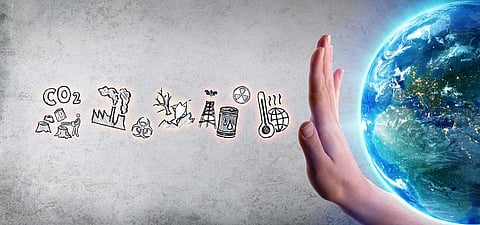

The 2010s will end with this year, but our actions and inaction in the past decade will shape the 2020s. An international non-profit has identified seven global challenges that will have a substantial impact on the next decade.
Forum of the Future has released a report that says plastics, migration and climate crisis, nationalism, online presence, participatory democracy, consumerism and biodiversity need urgent attention from world leaders.
Let’s delve deeper into why these issues are imperative in global growth:
Plastics
Awareness against plastic pollution is spreading, but not fast enough. When it comes to the plastics crisis, the researchers say, “Only a small amount of the current activity has truly transformative potential.”
They found that around eight million tonnes of plastic enters the ocean every year and only 14 per cent of plastic packaging is recycled. And, 83 per cent of the water we drink contains plastic fibre.
Although the public’s and businesses’ reaction has helped up recycling efforts, invent compostable alternatives and increased activism, but it hasn’t brought the fundamental shift need. The world still needs to change the way it produces, consumes and treats end-of-life in plastics, say researchers. The growing demand of convenience products and global throwaway culture drives plastic economies and it must stop, the report adds.
Migration and climate
Climate crisis is increasing poverty, fuelling drought and creating food and water shortages. Adding to this, is the growing inhospitable world that’s driving the migration rate to higher and higher levels. All this will lead to geopolitical instability.
Cape Town, Bengaluru and Jakarta are running out of water and a 100 million people, according to the World Bank, have been displaced by climate change. Also, a billion people are to migrate by 2050, says International Organisation for Migration.
Researchers suggest that instead of looking for sustainability, becoming more resilient could boost survival. Reimagining refugee camps, rethinking products and changing models of governance may save the world from the impending calamity.
Nationalism
A divisive nature of nationalist movement is rising around the world, says the report. With the re-election of Hungarian nationalist leader, another nationalist gaining power in Brazil, Brexit negotiations and the China-US trade war, the world seems to be moving towards a phase of fragmented global politics, says the report. Nationalism encourages opposition and exclusion of groups.
The number of people participating in politics has increased in the past decade, according to Economist Intelligence Unit’s Democracy Index 2018. This may also impact Sustainable Development Goals and climate change, observe researchers.
To overcome this, they suggest, people and organisations must look for new opportunities to come together with people from different background, build connections and empathy.
Being online
We are, 24X7, throughout the year, unregulated consumers of internet. So much that, social media is home to fake news, extreme views, trolls, deep-fakes, bots and data breaches.
Soon, ensuring to keep the world plugged in without destroying the planet will become a challenge, says the report.
Internet’s founding-father Tim Berners-Lee and professor of internet-law Jonathan Zittrain call for a repurposed internet that will be regulated and will protect users from fake news and data exploitation. Also, heavy scrutiny of tech giants is required.
The rise of participatory democracy
Participatory democracy, which means a system that tries to maximise involvement of citizens in decision making, is rising and so are efforts towards efforts towards an inclusive political system, teh report adds.
If this approach is to scale, more investment will be required. And, in the long run, local governments and civil society groups can adopt it. Also, businesses can engage with governments to overcome mass migration and climate breakdown.
Changing consumerism in Asia
By 2030, Asia will account for 59 per cent of the world’s middle-class consumption and India’s economy may overtake the UK’s in 2019. The wealth create may have helped pull many out of poverty, but the waste it generated and resources it exploited put more pressure on the planet that it can handle.
To regulate this, there should be a collective social and cultural effort by brands. They can engage consumers in a two-way conversation about the future of materialism in Asia, say researchers.
Biodiversity in free fall
We are experiencing the sixth mass extinction event. Compared to 60 million years before humans came into existence, extinction is happening 1,000 times more, said scientists in 2014.
Agriculture, the biggest driver of extinction, is causing 80 per cent deforestation and creating less space for wildlife.
Plants and animals are adapting to this change by constantly migrating. Urbanisation too is adopting evolutionary processes.
Researchers say this resilience and adaptation of change is our best hope.
New research indicates that there are corals that are far more resilient to rising ocean temperatures and acidification than previously thought. Also, regenerative farming systems, which aim to increase biodiversity, enhance ecosystem services, improve water cycles, increase resilience and strengthen the health and vitality of farm soil, could prove helpful.